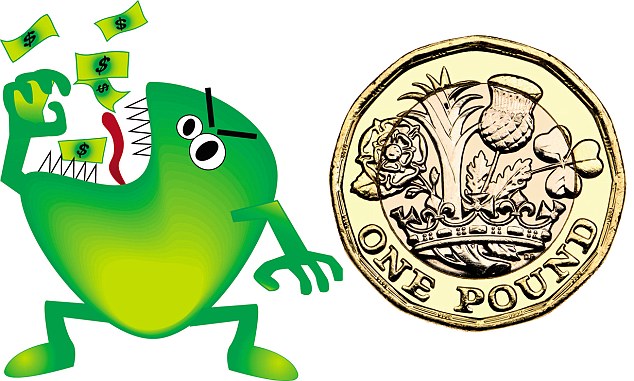Six steps to stop the inflation monster eating your money

The highest inflation rate for more than five years – at 3 per cent – is turning another screw on already squeezed family budgets.
With average pay rises at just 2.2 per cent it means householder spending power is falling behind.
The pressure will mount further on living standards if the first Bank of England base rate rise for a decade is applied next month, as predicted.


A pound is now worth less than a third of its 1983 value at 31p
Inflation is the ‘silent threat’ that eats away at the real value of cash over time. It means the new 12-sided one pound coin is now worth less than a third of its 1983 ‘round’ design predecessor.
Alistair McQueen, head of savings and retirement at insurer Aviva, says: ‘One pound now has a relative purchasing power of only 31 pence.’
Follow our six-step plan to beating the impact of inflation:
RELATED ARTICLES
Previous
1
Next

A November interest rate hike would be as much about…

Double whammy for savers as prices soar while interest rate…

10 ways to avoid inheritance tax: How to stop the taxman…

State pension set to rise by 3% in April thanks to triple…
Share this article
Share
25 shares
HOW THIS IS MONEY CAN HELP
How to invest in an Isa easily: Don’t know where to start? Just do this…
SAVINGS
The average easy access account pays just 0.42 per cent – seven times less than the new 3 per cent inflation rate as measured by the Consumer Prices Index. Some children’s accounts and interest-paying current accounts beat inflation, such as Nationwide Building Society’s at 5 per cent on balances of £2,500 (for a year only).
Anna Bowes, of research website Savings Champion, says: ‘There is no need for savers to put up with average rates. Someone switching £10,000 to the best paying savings rate from RCI Bank’s Freedom Account paying 1.3 per cent should earn £130 a year rather than just £42 from the average account.’
Index-linked savings certificates from National Savings & Investments have been a popular way to inflation-proof savings. These pay 0.01 per cent plus the more rarely used but higher inflation measure of the Retail Prices Index – currently 3.9 per cent.
The certificates are not available to new savers but millions of existing holders have the option to roll over certificates on maturity. Laith Khalaf, of broker Hargreaves Lansdown, says: ‘It is a no-brainer to hang on to them.’
> Check This is Money’s independent best buy savings tables






